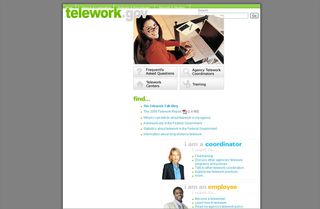Is Remote Working Right for You and Your Business?

Between collaboration software, remote access solutions, faster broadband speeds, and voice and video calling from the desktop, technology has finally matured to the point where working from home is becoming routine for many employees (Read Top 10 Tools for Remote Workers). In fact, a 2010 Microsoft U.S. Remote Working Research study found that 72 percent of those surveyed would prefer to regularly work from home. Among the most cited reasons for punching the clock from a distance? Some 60 percent of people telecommute to maintain a work/home balance, and 55 percent see working from home as a way to save gas.
Most interestingly, some 71 percent say they are more productive when working remotely. But just because innovation has made commuting to a physical office unnecessary for many, that doesn’t mean all businesses embrace the idea of empty cubicle farms. That same Microsoft study revealed that, according to employees, less than 40 percent of employers are generally supportive of remote working arrangements.
So which businesses should let their workers telecommute, and what strategies should they follow so that both employees and employers reap the benefits?

Who Should (and Shouldn’t) Be Remote
Kate Lister, coauthor of Undress for Success: The Naked Truth About Making Money at Home and owner of the Telework Research Network, describes businesses that will benefit most from remote workers: “Anytime you’ve got somebody sitting in front of a computer screen for the majority of the day or sitting at a telephone...those are the kind of people that ought to be [working] remotely.”
Still, businesses have plenty of concerns about managing a remote workforce and what impact it might have on everyone else. “A lot of times people think, ‘Oh, we’re never going to see our employees, our culture’s going to suffer, everyone will be lonely,’ and so on and so forth,” Lister said. The fact is that most people work from home just half of the time.
Nevertheless, not everyone is cut out to work from home. David Ballard, PsyD, assistant executive director with the American Psychological Association, believes that the telecommuters who excel tend to work very well independently. “In general, those employees for whom telecommuting is a good fit are extremely happy with their work arrangements,” Ballard said. “Employees often cite the autonomy and flexibility that telecommuting allows as two of the most valuable aspects of the job.”
Stay in the know with Laptop Mag
Get our in-depth reviews, helpful tips, great deals, and the biggest news stories delivered to your inbox.
Jenny Benevento, taxonomist and user experience architect for Sears Holdings Corporation, works from home a few days a week due to a lack of space in the company’s downtown Chicago office. “I think Sears would like to have people who currently work in the office working at home because it can trust those people to deliver,” said Benevento. “And then Sears can use the cubes for the new people.”
Getting Started
To help businesses plan their strategies, there are numerous examples of telecommuting and remote working policies available on the web, including Telework.gov and Lister’s TeleworkResearchNetwork.com. A good policy lays out ground rules, such as working hours, responsibility for expenses, methods of communication, how IT support will be handled, child care, and liability issues.

In most cases, your business will not have to fork over money for remote workstations. Dr. Eileen Gallagher, program chair for the education department at American Intercontinental University, also works from home full time. She says that all of her professors, as well as the students, are responsible for having a computer with Internet access on which to conduct classes. “The main campus is the online program. The teachers have to provide their own equipment, but the school provides all of the software.”
Lister concurred, telling us, “the majority of companies do not pay for home office technology.”
Telecommuting Benefits
Beyond saving money on gas and achieving a better work-life balance, both Dr. Gallagher and Benevento cited the ability to exert more control over their daily schedules and to prioritize independently as key benefits of remote working. “When non-important issues come up, like when an e-mail pops up and someone wants something but it’s really not a priority, I can put it off,” Dr. Gallagher said. “In a face-to-face environment, when someone walks in and they want something, they’re going to wait there until you give it to them, regardless of how inconsequential it is.” Because Dr. Gallagher has a 24- to 48-hour window to answer e-mails, and she can turn off instant messaging if she’s really swamped, she can prioritize much better in the online environment than she ever could at the office.
Benevento believes that she’s also more efficient as a telecommuter than as a traditional office worker, because she “definitely schedules things more than before.” While she was once at the whim of those who scheduled a meeting with her, Benevento now has more control over her calendar, which has made her more productive. “That’s sort of a responsibility that you get,” Benevento said. “You’re expected to get things done or at least be more present. If anything, I think it makes me communicate more often with my boss.”
Trust That’s Earned
Most of the experts we spoke with agreed that the success or failure of a telecommuting program depends on both the employee and the employer. And the two most important ingredients are trust and results-based management.
Trudy Spence-Parker, vice president of human resources for New Jersey American Water, says that based on her 20 years of human resources experience, the success of telecommuting is defined by a few key factors. “It depends on the technological environment; it depends on innovation requirements; it depends on whether the organization or the business is focused on managing by objectives.”
According to Lister, trust is fundamental, as is instituting a system in which you manage by results. “It doesn’t matter where people work or how or when they work. The point is do they get the job done? And the only way you’re going to know that is if you’re managing by results.”
Lister argues that regardless of whether employees are labeled as telecommuters, the majority of today’s workforce is mobile. And since many employees are away from their desks at least some of the time, businesses that employ results-based management will be more successful overall.

Communication with a Human Touch
Telecommuters and remote workers who are away from the office the majority of the time may have to work hard to make sure that their voices are heard. There are also concerns that remote workers may start to feel isolated. For employees that rarely visit the office, there are meet-up groups of remote workers that could help keep them engaged. One such group is Jelly (WorkatJelly.com), which organizes workday get-togethers in more than 100 cities worldwide. Remote workers or freelancers bring their laptops to a communal space and work all day around other people with whom they can share both ideas and a casual work environment.
Ballard argues that regular communication with telecommuters is crucial. “If remote workers become isolated, team cohesion can suffer.” As a result, he says that it’s important for organizations to use existing technology—such as network access, shared workspaces, telephone and video conferencing, instant messaging, and project management software—to keep remote workers connected to the team’s day-to-day functioning. Ballard added that those in the office “should be trained in the skills required to effectively manage telecommuters.”
Remote Possibilities
Working remotely has side benefits as well. Benevento says that if people know she’s not going to be in the office, they’ll send her a really direct e-mail in which they sum everything up. In other words, her telecommuting forces those back at the office to be more focused.
The bottom line is that implementing a telecommuting/remote work policy has benefits that reach far beyond your employees’ happiness. It reduces absenteeism, increases employee retention, and saves on real estate costs. Plus, being open to remote workers expands your business’ talent pool, allowing you to find the absolute best person for a position, instead of just the most capable local candidate.
Dr. Ballard sums it up best. “The use of flexible work arrangements isn’t just an employee benefit—it’s a competitive business strategy.”
